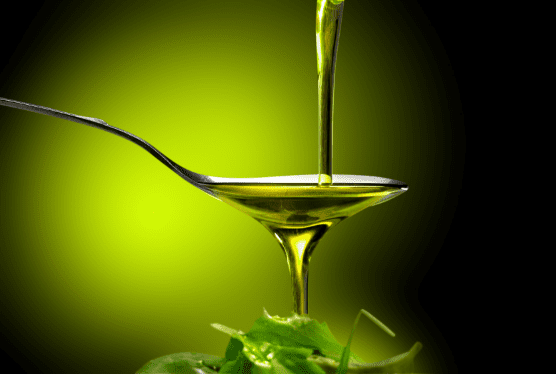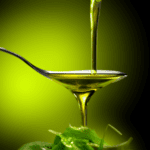
| Olive oil is incredibly healthy. Like the avocado, olive oil is an amazing “healthy fat” that is packed with beneficial lipids, antioxidants, and specific compounds only found in olives. It’s also full of amino acids and 36 other known compounds that are anti-inflammatory and anti-bacterial. As a fruit juice, understand the benefits and process to produce olive oil and why the purity of the product delivers health benefits that the adulterated versions (70-80% of American EVOO) don’t. Olive oil is a fragile product, like wine. It goes rancid easily if exposed to excess light, oxygen, or heat. The compounds that make olive oil so beneficial are fragile and easily deteriorate with oxidation, heat, acidity, and light exposure. When EVOO is adulterated or cut with a cheaper acidic oil or chemically altered, there may not be a difference to the eye, but the good compounds will be greatly diminished or gone. In the past twenty years, many studies have found that two major compounds in olive oil are responsible for its anti-inflammatory properties, which even compete with ibuprofen without the side effects of medication. These two major compounds are oleic acid and oleocanthal. Oleic acid is a monounsaturated fat and makes up about 73% of EVOO. In this complex are several other polyunsaturated fats – the types of fats the modern diet usually falls short on that the Mediterranean diet emphasizes. These are the fats found in nuts, seeds, fatty fish, avocados, and dark chocolate. In short, MUFAs and PUFAs also provide Omega-3 and Omega-6 amino acids. These good fats help with weight loss, heart health, and reduced blood pressure. About 25-30% of a diet should be based on these harder-to-find fats that olive oil is rich in. One study across 7,400 subjects found that those who drank 4 tablespoons of olive oil daily saw a 30% decrease in heart disease compared to those who ascribed to a low-fat diet over five years due to the oleic acid concentration. EU food regulators have established olive oil as a crucial source of lipids, and that very high quality certified EVOO can use the language that 20mg/day can “contribute to the protection of blood lipids from oxidative stress.” Secondly, olive oil contains 36 different phenolic compounds, the main one being oleocanthal, which can only be found in olives. A study published by Nature (one of the most respected science journals) found that oleocanthal has anti-inflammatory effects like ibuprofen. Yes, maybe a shot of olive oil will work just as much as Advil without any medication side effects. Oleocanthal as a compound does not work the same way ibuprofen works to reduce inflammation, but it targets the same receptors to diminish pain and reduce inflammation, creating a very similar result as ibuprofen. EVOO has also been shown to be anti-microbial. Studies have shown it to target bad gut bacteria, and it’s been shown to help with ulcers. Some studies have shown that olive oil actually fights cancer tumors in test tubes and attacks bad gut bacteria. Studies have shown that drinking olive oil can help with ulcers and digestive issues. With all the proven benefits of olive oil, it’s interesting that it has mostly been marketed as a “butter replacement” instead of a type of superfood. The merits of a shot of apple cider vinegar are not studied, but the benefits of a shot of olive oil a day have shown significant health gains. It may be a contributor as to why Italians can eat carbs and not gain weight. Cooking with olive oil will add flavor, but the beneficial compounds are heat sensitive so EVOO is best for dipping or dressings. The delicate nature of these compounds is also why the integrity of an EVOO label matters, even when there’s not a noticeable taste difference, which can be easily faked with concentrates. |


